Imagine a bard reaching for their instrument, seemingly about to buff a party member. Suddenly, an unnatural, dissonant melody echoes across the battlefield as the bard supports their comrade not with an inspiring tune, but via a chilling aria that speaks of long-dead specters!
Bards in the College of Spirits, a subclass introduced in Van Richten’s Guide to Ravenloft, are like leaders of a séance, weaving tales of creatures who have long since past from the Material Plane. When these singers open their mouths, spirits speak through them.
College of Spirits features
- Guiding Whispers: At 3rd level, when you join this college, you learn the Guidance cantrip and can cast it at a range of up to 60 feet. This increased range permits you to aid party members in situations you otherwise might be unable to, such as if they are scaling a cliff or are onstage putting on a performance. You can flavor this cantrip as you summoning a spirit to lend a hand.
- Spiritual Focus: You also receive a Spiritual Focus at 3rd level. This focus can take the form of a candle, crystal ball, ouija board, deck of tarokka cards, or a skull. The focus just adds flavor to this subclass until 6th level. At that level, when you cast a bard spell that deals damage or restores hit points through your Spiritual Focus, you can roll a d6 and add it to one roll of the spell.
- Tales from Beyond: The College of Spirits' bread and butter is the 3rd-level feature Tales from Beyond. As a bonus action, you can spend a Bardic Inspiration die to roll on the Spirit Tales table (shown below). Each tale has a different effect, ranging from teleporting targets to dealing psychic damage to enemies. You can retain one tale at a time and only until you either use the effect or finish a short or long rest. Using an action, you can bestow the tale’s effect on a target within 30 feet, including yourself. The tales are also prefaced with flavorful hooks that make for great roleplaying fuel. For instance, the psychic damage effect occurs when the bard orates a fable of an incomprehensible, mind-bending being. Perhaps the bard has communed with the deceased follower of an eldritch god from beyond the stars like Cthulhu!
Spirit Tales
| Tale Told Through You | Bardic Insp. Die |
| 1 | Tale of the Clever Animal. For the next 10 minutes, whenever the target makes an Intelligence, a Wisdom, or a Charisma check, the target can roll an extra die immediately after rolling the d20 and add the extra die’s number to the check. The extra die is the same type as your Bardic Inspiration die. |
| 2 | Tale of the Renowned Duelist. You make a melee spell attack against the target. On a hit, the target takes force damage equal to two rolls of your Bardic Inspiration die + your Charisma modifier. |
| 3 | Tale of the Beloved Friends. The target and another creature of its choice it can see within 5 feet of it gains temporary hit points equal to a roll of your Bardic Inspiration die + your Charisma modifier. |
| 4 | Tale of the Runaway. The target can immediately use its reaction to teleport up to 30 feet to an unoccupied space it can see. When the target teleports, it can choose a number of creatures it can see within 30 feet of it up to your Charisma modifier (minimum of 0) to immediately use the same reaction. |
| 5 | Tale of the Avenger. For 1 minute, any creature that hits the target with a melee attack takes force damage equal to a roll of your Bardic Inspiration die. |
| 6 | Tale of the Traveler. The target gains temporary hit points equal to a roll of your Bardic Inspiration die + your bard level. While it has these temporary hit points, the target’s walking speed increases by 10 feet and it gains a +1 bonus to its AC. |
| 7 | Tale of the Beguiler. The target must succeed on a Wisdom saving throw or take psychic damage equal to two rolls of your Bardic Inspiration die, and the target is incapacitated until the end of its next turn. |
| 8 | Tale of the Phantom. The target becomes invisible until the end of its next turn or until it hits a creature with an attack. If the target hits a creature with an attack during this invisibility, the creature it hits takes necrotic damage equal to a roll of your Bardic Inspiration die and is frightened of the target until the end of the frightened creature’s next turn. |
| 9 | Tale of the Brute. Each creature of the target’s choice it can see within 30 feet of it must make a Strength saving throw. On a failed save, a creature takes thunder damage equal to three rolls of your Bardic Inspiration die and is knocked prone. A creature that succeeds on its saving throw takes half as much damage and isn’t knocked prone. |
| 10 | Tale of the Dragon. The target spews fire from the mouth in a 30-foot cone. Each creature in that area must make a Dexterity saving throw, taking fire damage equal to four rolls of your Bardic Inspiration die on a failed save, or half as much damage on a successful one. |
| 11 | Tale of the Angel. The target regains hit points equal to two rolls of your Bardic Inspiration die + your Charisma modifier, and you end one condition from the following list affecting the target: blinded, deafened, paralyzed, petrified, or poisoned. |
| 12 | Tale of the Mind-Bender. You evoke an incomprehensible fable from an otherworldly being. The target must succeed on an Intelligence saving throw or take psychic damage equal to three rolls of your Bardic Inspiration die and be stunned until the end of its next turn. |
- Spirit Session: This 6th-level feature adds flexibility to the College of Spirits bard. Once per long rest, you can conduct an hour-long ritual with a number of creatures equal to your proficiency bonus (including yourself). Afterward, you temporarily learn a divination or necromancy spell from any class, and that spell counts as a bard spell. The spell level must be equal to the number of creatures who participated in the ritual, and be a spell level that you can cast. (Here is a complete list of spells you can learn.) The spell is retained until you take a long rest.
- Mystical Connection: At 14th level, College of Spirits bards gain more control over their Tales from Beyond. You can now roll a die twice when rolling on the Spirit Tales table, choosing which of the two effects to bestow. If you roll the same number twice, you can choose any effect!
Pros
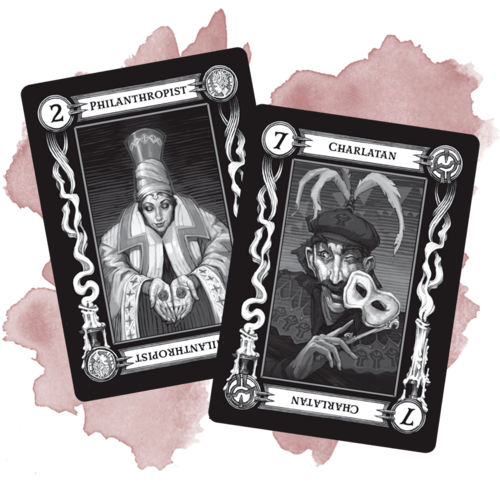 The College of Spirits offers much in the way of versatility and flavor, along with a healthy dose of randomness that will keep play interesting. Being able to cast Guidance at range is a fantastic means of supporting party members, and Tales from Beyond offers myriad opportunities for players to collaborate with their Dungeon Master on the appearance of a tale’s effect. For more flexibility, bards can even start the adventuring day by rolling on the Spirit Tales table and holding onto the rolled effect until they complete a short rest.
The College of Spirits offers much in the way of versatility and flavor, along with a healthy dose of randomness that will keep play interesting. Being able to cast Guidance at range is a fantastic means of supporting party members, and Tales from Beyond offers myriad opportunities for players to collaborate with their Dungeon Master on the appearance of a tale’s effect. For more flexibility, bards can even start the adventuring day by rolling on the Spirit Tales table and holding onto the rolled effect until they complete a short rest.
Spirit Session lets you access magic that you might otherwise skip when choosing spells. For instance, you can temporarily pick up spells such as Identify and Locate Object when it would benefit you. Your selection of spells that restore hit points is severely limited, but you do gain access to Revivify, which is a stellar option when you're anticipating combat.
Cons
Although Tales from Beyond has some great effects, the random nature of the Spirit Tales table might be off-putting to some players. The range of 30 feet could also require bards to wander closer to the fight in order to use each tale’s effect. Keep in mind, Bardic Inspiration has a range of 60 feet.
The big issue with the College of Spirits subclass, however, lies in the 6th-level Spiritual Focus feature. It specifies that you can only add a d6 to a spell that is cast through the focus. This means the spell must require material components. Spells such as Vicious Mockery and Healing Word won't benefit from this subclass feature as they only require verbal components.
Meet Knee-Knee, the Vistani-trained violinist
In the center of the misty forest crossroads was a campfire, bordered on all sides by brightly decorated wagons and dancing groups of traveling folk. These were the Vistani, and as they undulated their bodies to the tunes of lutes, tambourines, and violins, one figure seemed to stand out from the rest. Upon closer inspection, this figure wasn’t even human. It was a kenku, dressed in colorful Vistani garb, playing in sync with her companions.
Suddenly, the melody of the campfire took on a mysterious, dissonant tone. The kenku amplified this with several shrill vibrations of her violin strings, and as she did so, her pupils rolled backwards. A sinister voice emerged from her beak, telling the saga of a long-forgotten phantom. For a moment, it seemed as if this was no mere forest clearing, but a meeting ground for souls from the Ethereal Plane.
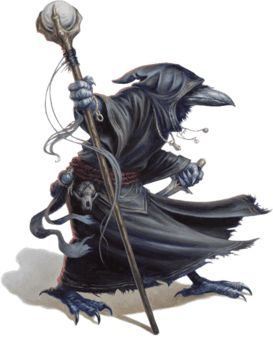 Knee-Knee is a chaotic neutral kenku and former burglar who got her name from the scars on her knees, which she obtained after taking a nasty fall during a getaway. Her life of crime came to an end when she tried stealing an instrument from a group of traveling Vistani. She was caught, but to her surprise the travelers welcomed her into their group, remarking that she reminded them of wereravens.
Knee-Knee is a chaotic neutral kenku and former burglar who got her name from the scars on her knees, which she obtained after taking a nasty fall during a getaway. Her life of crime came to an end when she tried stealing an instrument from a group of traveling Vistani. She was caught, but to her surprise the travelers welcomed her into their group, remarking that she reminded them of wereravens.
Knee-Knee found that the group of Vistani were kind, and that her Mimicry made her a talented musician. Eventually, a Vistani bard gifted Knee-Knee the instrument she had sought to steal. They told her it was called a violin. Enamored by the instrument because it made a high-pitched sound that reminded her of her name, Knee-Knee could soon emulate dozens of tunes merely by observing others play the violin. She also learned tales from spirits that she and her newfound family encountered during trips into a realm known as the Shadowfell. Before long, Knee-Knee made it her goal to collect as many sounds and stories as possible — from both the living and the nonliving.
Playing Knee-Knee
Knee-Knee is a chaotic neutral bard with the Criminal background. Her highest ability scores are in Charisma and Dexterity, while her Strength is below average. She has proficiency and Expertise in the following skills:
- Acrobatics
- Deception
- Perception
- Performance (Expertise)
- Persuasion
- Sleight of Hand
- Stealth (Expertise)
Due to her Mimicry and fondness for sounds, Knee-Knee favors spells with verbal components, such as Message, Vicious Mockery, Dissonant Whispers, and Healing Word. Magic Mouth is also one of her personal favorites, since the kenku derives great delight from transmitting the sounds she collects from various inanimate objects.
The stories that Knee-Knee’s adoptive Vistani family tell her of Shadowfell ghosts can be used to flavor the College of Spirits' Tales from Beyond feature. Knee-Knee also has plenty of volunteers for her daily Spirit Session, allowing her to access circumstantial spells that can aid others. For spells requiring material components, Knee-Knee will use a Vistani tarokka deck as her Spiritual Focus.
Considering her relationship with the only group that navigates the Mists between the Shadowfell’s Domains of Dread, Knee-Knee can make for an excellent companion in any party.
Sing to the Mists
Knee-knee is but one example character you can build as a College of Spirits bard. If you’ve ever been drawn to the mournful sound of minor chords or dreamed of changing the tide of battle with nightmarish medleys, look no further than this subclass. Just be wary of the spirits that speak through you!
Van Richten's Guide to Ravenloft is available to purchase on D&D Beyond! It offers two new subclasses, lineages, all-new monsters, and more! Master-tier subscribers can share content they purchase in the marketplace with players in their campaigns.
Jeremy Blum (@PixelGrotto) is a journalist, gaming blogger, comic book aficionado, and fan of all forms of storytelling who rolled his first polyhedral dice while living in Hong Kong in 2017. Since then, he's never looked back and loves roleplaying games for the chance to tell the tales that have been swirling in his head since childhood.








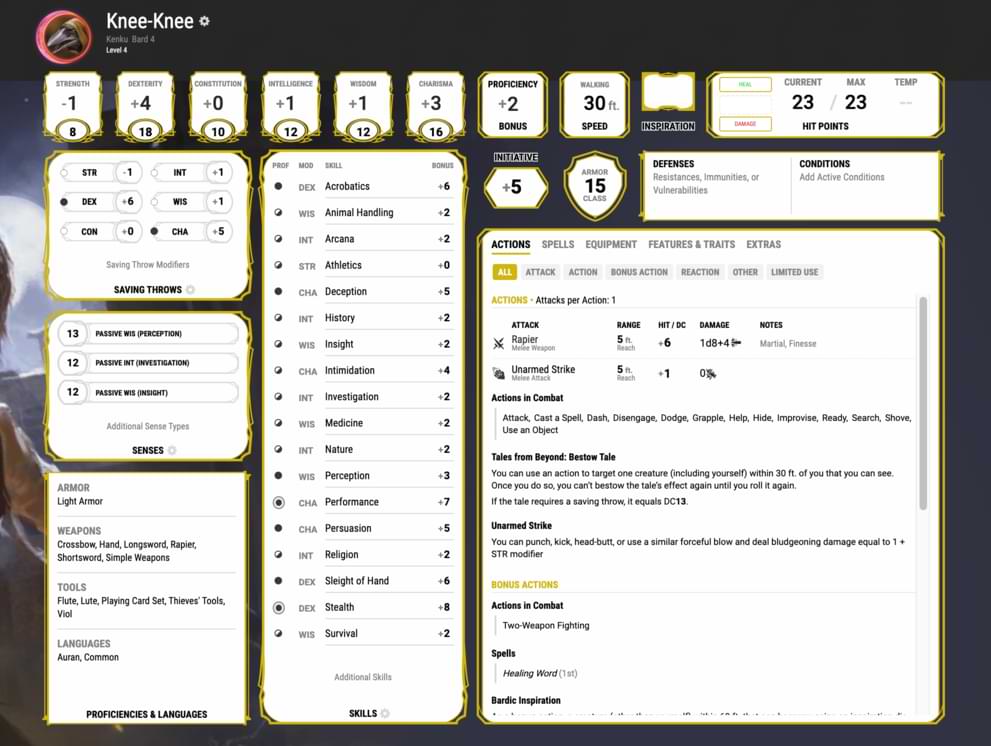
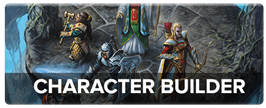
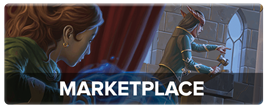
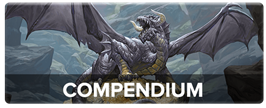
-
View User Profile
-
Send Message
Posted May 6, 2021Yessss brother sooo cool
-
View User Profile
-
Send Message
Posted May 6, 2021The grave touched ability still seems way op, but other than that, I like the undead warlock.
-
View User Profile
-
Send Message
Posted May 6, 2021Undead patron is way too strong at the moment, it needs some serious rebalancing. Just look at undying and then look at undead patron, its the sky and earth
-
View User Profile
-
Send Message
Posted May 6, 2021I expect there'll be quite a few changes to the final versions. I like the idea of both of them, but I'm not sure how much I like the College of Spirits in practice.
In particular I don't like that Tales from Beyond is random, I think it should just let you pick which tale you tell, limited by the size of the dice you use (so the free d6 still limits you only to the first 6 and so-on); it just doesn't make a lot of sense for it to be random when it has such a short range, as you're rolling for only a chance at something useful. Alternatively a later ability could let you use your Bonus Action to choose the result (or roll twice or something), so you're giving up any further actions in exchange for more control.
Generally if something requires a random roll for a mixed bag of effects that may or may not help, then something has gone wrong in the design stage; it can be fun for consequences of something going wrong (like Wild Magic Surges) or things that are intended to be funny (like the Wand of Wonder) but core class abilities should never be random IMO, especially in a game that's already pretty reliant on dice rolling.
-
View User Profile
-
Send Message
Posted May 6, 2021Isn't Undying generally considered the absolute worst/weakest Warlock subclass?
I mean, I see it on lists of worst with Banneret/Purple Dragon Knight for Fighters and Way of 4 Elements for Monks.
-
View User Profile
-
Send Message
Posted May 6, 2021Not being able to pick the tale makes the ability too unreliable, I suppose you could house rule that you can pick but at that point it could be OP.
Letting players choose, OP or on par with some of the more powerful subclasses?
-
View User Profile
-
Send Message
Posted May 6, 2021It wasn’t terribly well received, true.
The Undying had more of a focus on...how to put this...making you seem like you were “undead”...moving among zombies...severed body parts that could still move around...
The Undead seems like it’s focused about the POWER that all these patrons get by being an undead super being...thus, these Warlocks might be more inclined to make Pacts for such reasons.
Being a lifeless husk or a rotting corpse isn’t the goal...it’s about the power or immortality.
The physical conditions are just a side effect.
They need to tweak Grave Touched so it can’t stack the bonus damage to absurd levels...but I’d say that’s about all they need to do.
-
View User Profile
-
Send Message
Posted May 6, 2021Certainly the random magical effects have their place with certain subclass...Wild Magic Sorcerers are all about unpredictable magic.
Similarly, Wild Magic Barbarians are about unpredictable, extreme emotions manifesting as magic when they Rage.
In both those cases; it makes sense for the magic to be randomized.
I would agree that a Spirits Bard should have some degree of control over what Tales they tell...similar in choosing as how a Battlemaster Fighter might pick their Maneuvers...but perhaps more specifically like a Rune Knight Fighter (as they only receive more powerful runes at higher class levels)...or even Matt Mercers “College of Maestros” subclass.
You could argue that the “spirits” are unpredictable...but I find that to be a flimsy reason, and limited to a specific type of character.
I suspect that this will be a major change when the book releases.
-
View User Profile
-
Send Message
Posted May 6, 2021I'll be honest I did not have a lot of interest in the sourcebook until now. Seeing this, I am definitely at least going to buy the subclasses! Suddenly excited about this release!
-
View User Profile
-
Send Message
Posted May 6, 2021Agreed on the example characters! This was something I enjoyed from the 3.5e Draconomicon, where there is an entire index of dragon characters at different stages of growth for each character to drop into your game.
-
View User Profile
-
Send Message
Posted May 6, 2021I know you choose the target after but this could be hilarious for a oneshot
-
View User Profile
-
Send Message
Posted May 6, 2021Mumm-Ra approves of the Undead Patron.
"Ancient Spirits of Evil, transform this decayed form... to Mumm-Ra, the Ever-Living!"
-
View User Profile
-
Send Message
Posted May 6, 2021The 3.5 Draconomicon is a GREAT book just for the pages and pages of dragon lore. Glad you like the example characters, y'all can hopefully expect to see more in the future!
-
View User Profile
-
Send Message
Posted May 6, 2021How much has changed from the Unearthed Arcana version of The Undead warlock patron to this Ravenloft version?
-
View User Profile
-
Send Message
Posted May 6, 2021So... How is the new "Undead" warlock patron not exactly the same concept as "The Undying" subclass from SCAG? Every new publication doesn't require new (and ever more overpowered) subclasses. Maybe just trying being true to the original Ravenloft material instead, because Wizards has been severely lacking in that department.
-
View User Profile
-
Send Message
Posted May 7, 2021As others have stated, the Undead Warlock is wildly OP, and it will never see my table, except as an NPC.
Eldritch Blast + Grave Touched + Spirit Shroud is so ridiculous it can't be allowed at a table.
-
View User Profile
-
Send Message
Posted May 7, 2021Honestly, the issue with Spiritual Focus looks like an accidental design oversight. I hope it will be fixed in the upcoming book.
I played my College of Spirits bard through the Curse of Strahd and it was a lot of fun! It's hard to use Tales from Beyond, because some benefits it gives are situational, which is not working very well with a random ability. However, the Spiritual Focus makes this bard a potent healer and damage dealer.
-
View User Profile
-
Send Message
Posted May 7, 2021Excellent article, quality has really improved on the site lately :)
-
View User Profile
-
Send Message
Posted May 7, 2021Shakan, casting Speak with Dead on the victim of a trap: "excuse me, do you have time for a brief survey?"
-
View User Profile
-
Send Message
Posted May 7, 2021the undying saw very little play time (and it was FR grounded) so they wanted to improve it and make one more universal because its such a cool concept.